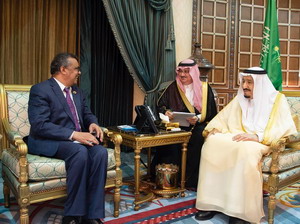 Dr Tedros Adhanom Ghebreyesus, WHO Director-General, and King Salman Ben Abdel Aziz of Saudi Arabia (right)
Dr Tedros Adhanom Ghebreyesus, WHO Director-General, and King Salman Ben Abdel Aziz of Saudi Arabia (right)
30 April 2018, Riyadh – Dr Tedros Adhanom Ghebreyesus, WHO Director-General, paid his first visit to Saudi Arabia Sunday on 29 April to meet with the Custodian of the 2 Holy Mosques, King Salman Ben Abdel Aziz.
“It has been a great honour to visit the Kingdom of Saudi Arabia – a highly valued partner in global health, said Dr Tedros. We look forward to expanding on this important collaboration through the coming years. The Kingdom of Saudi Arabia is a key strategic partner both in the region and globally.”
Saudi Arabia plays a vital role in WHO’s humanitarian work around the world. The Kingdom has generously contributed to polio eradication efforts. At country level, it has taken important pioneering steps to improve the health of its people, as well as the health of millions of pilgrims visiting Saudi Arabia for hajj and umra.
Dr Tedros also met with HE Mr Adel bin Ahmed Al-Jubeir Minister of Foreign Affairs, Dr Tawfig Al-Rabiah, Minister of Health and HE Dr Abdullah bin Abdulaziz Al Rabeeah, Supervisor General of the King Salman Humanitarian Aid and Relief Centre.
Protecting the health of the people of Saudi Arabia
Dr Tedros congratulated Saudi Arabia on initiating a series of health care reforms known as “Vision 2030”, including a major effort to achieve universal health coverage – one of the cornerstones of the programme of work to be discussed at the forthcoming World Health Assembly in Geneva (21–26 May).
Saudi Arabia has made significant progress in improving people’s health. “I’d like to acknowledge the leadership of the Minister of Health and his commitment to strengthening public health, and health systems, and in moving towards universal health coverage. WHO looks forward to continuing to support this work from all 3 levels of the Organization,” said Dr Tedros.
He acknowledged progress on another priority issue for WHO: noncommunicable diseases, which are currently the top cause of death in the country. The Ministry of Health has established a national strategy devoted to addressing NCDs, with a strong focus on prevention. Saudi Arabia has recently passed landmark legislation to tax sugary drinks and tobacco products – in line with WHO recommendations.
Dr Tedros congratulated the Ministry of Health for its success in averting major outbreaks of diseases, including Middle East respiratory syndrome, among the 3 million pilgrims who visit the Holy Sites every year. WHO provides technical and consultative support to the Ministry, working closely with the WHO collaborating centre that leads the development and implementation of measures to safeguard public health during mass gatherings.
He was accompanied by Dr Jaouad Mahjour, acting WHO Regional Director for the Eastern Mediterranean, Dr Lubna Abdulrahman M. Alansari, Assistant Director General for Metrics and Measurement, and Dr Ibrahim el Ziq, WHO Representative to Saudi Arabia.
Note to editors
In recent years, Saudi Arabia has provided over US$ 35 million to enable WHO and UNICEF to vaccinate tens of millions of children in countries in Africa and the Middle East, as well as in Afghanistan and Pakistan. The King Salman Humanitarian Aid and Relief Centre and WHO agreed to a new commitment of US$ 3.3 million to provide Syrian children with routine vaccinations, including for measles and polio.
Since 2002, Saudi Arabia’s leadership of polio eradication efforts through the Organization of Islamic Cooperation (OIC) and the Islamic Development Bank has resulted in 54 of the 57 OIC Member States becoming polio-free. Saudi Arabia's steadfast religious support to address misconceptions about polio vaccines through fatwas issued by the International Islamic Fiqh Academy in Jeddah has significantly increased community trust and acceptance of vaccinations in all Muslim communities, while leadership by the Islamic Advisory Group for polio eradication has further strengthened eradication efforts.
Saudi Arabia has contributed generously to WHO’s Health Emergencies Programme, notably its funding for programmes in Syria and Yemen and neighbouring countries. The Centre has recently announced a US$ 2 million for WHO to upgrade a vital hospital in Cox’s Bazar (the Sadar Hospital), Bangladesh, as part of the response to the Rohingya crisis.
Media contact
Fadéla Chaib
Coordinator a.i, Media, Social Media and Monitoring
Tel: +41227913228
Mobile: +41794755556
Email:
Related links
King Salman Humanitarian Aid and Relief Centre


